
Robohub.org
25 women in robotics you need to know about – 2016
by Women In Robotics, Andra Keay, Hallie Siegel, Kassie Perlongo and Sabine Hauert
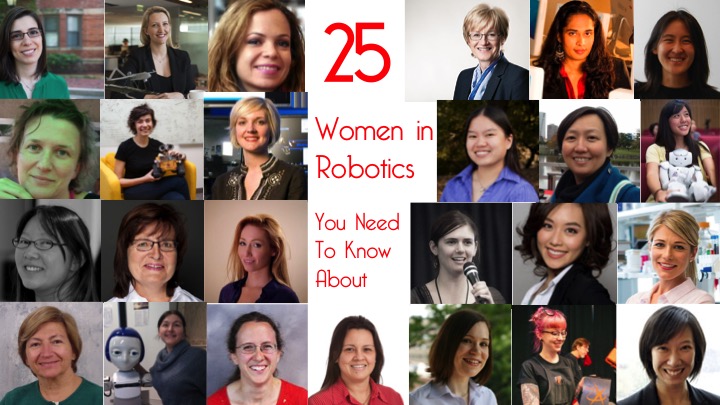
Editor’s note:
In celebration of International Women’s Day, we’re reposting our latest ‘25 Women in Robotics You Need to Know About‘ list. Over the last four years, Robohub has featured 100 inspiring women leading future developments within robotics, with plenty more for the years to come!
Our next edition will be released on Ada Lovelace Day.
In celebration of Ada Lovelace Day, we’ve compiled our fourth annual ‘25 Women in Robotics You Need to Know About‘ list. That’s 100 women who have been featured to date. We’re showcasing women working in research, development, and commercialization of robotics. The role models are diverse, ranging from emeritus to early career stage. Even though the total number of women in robotics is still relatively small, we’re celebrating that women are leading the way within this field.
Role models are important. Countess Ada Lovelace, the world’s first computer programmer and an extraordinary mathematician, faced an uphill battle in the days when women were not encouraged to pursue a career in science. Fast forward 200 years, there are still not enough women in science, technology, engineering or math (STEM). One key reason is clear: a severe lack of visible female role models. Women in STEM need to be equally represented at conferences, keynotes, magazine covers, or stories about technology. Although this is starting to change, it’s not happening quick enough.
To address that challenge, Suw Charman-Anderson started Ada Lovelace Day in 2009 in response to the lack of visibility of women in STEM (not the lack of women). It’s an international day celebrating the achievements of women in STEM. Everyone is encouraged to add an event or a story to the Finding Ada site.
A recent study from the Clayman Institute for Gender Research at Stanford found that visibility was the missing factor preventing women from moving into leadership positions within their organization. This has a cumulative effect on career progression and earnings. These findings support an earlier study with the Anita Borg Institute, who interviewed 1800 women in technology companies. According to the authors, women reported being less likely than male counterparts to be assigned to high visibility projects, which in turn, has a negative impact on their chances for future promotions.
We’d like to think that this annual list is opening eyes from within the robotics community, and beyond. One of our 2015 listees Spring Berman wrote to Robohub and said, “I’m so grateful for the mention in Robohub’s 25 women in robotics! The president of ASU saw the article about it in our university news, and now he wants to visit our lab in mid-April to see our work. Hopefully we can get together a cool demo to show him!”
Without further ado, here are 25 women in robotics you should know about (in alphabetical order) for 2016. Enjoy!
 |
Nora Ayanian Assistant Professor and Director of the ACT lab at USC Nora Ayanian’s research focuses on creating end-to-end solutions for multirobot coordination, to enable people to use teams of robots. Ayanian is the recipient of the 2016 Okawa Foundation Research Grant and is an MIT Technology Review TR25 Top Innovator. |
 |
Catherine Ball Founder & CEO, Remote Research Ranges / Managing Director, Elemental Strategy Catherine Ball won Telstra Queensland Business Woman of Year (2015) for her drone work. She is an environmental scientist, author and now the CEO of an Australian startup working with the application of Remotely Piloted Aircraft Systems (RPAS) across remote communities, schools, industry, and citizen scientists. Dr. Ball is leading the call for discussions around the ethics of spatial data, aka geo-ethics. |
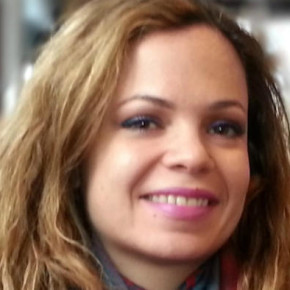 |
Margarita Chli SNF Assistant Professor at ETHZ, Honorary Fellow of the University of Edinburgh Margarita Chli is an SNF Assistant Professor leading the Vision for Robotics Lab at ETH Zurich, Switzerland and an Honorary Fellow of the University of Edinburgh in the UK. Previously, she was a Chancellor’s Fellow and Lecturer at the School of Informatics at the University of Edinburgh, and before that, she was at the Autonomous Systems Lab (ASL) of ETH Zurich, where she held the post of Deputy Director, Senior Researcher and Lecturer. Her research interest is in Computer Vision for Robotics, focusing on real-time perception for micro-aerial vehicles. Over the years, she’s been involved in a number of European projects (AEROWORKS, SHERPA, myCopter,sFly). |
 |
Vivian Chu Graduate Research Assistant at Georgia Institute of Technology Vivian Chu is a Graduate Student Research Assistant at Georgia Institute of Technology, studying perception, AI and cognition, and interaction. Chu’s paper on “Using Robotic Exploratory Procedures to Learn the Meaning of Haptic Adjectives” was awarded the Best Cognitive Robotics Paper at ICRA 2013. |
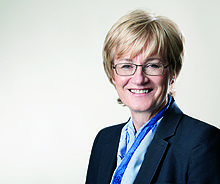 |
Mady Delvaux European Parliament MEP Mady Delvaux (S&D, LU) is a Member of the European Parliament. Alongside an extensive draft report on “Civil Law Rules on Robotics,” Delvaux proposes the creation of a legal framework for automation and ways to promote European industry. |
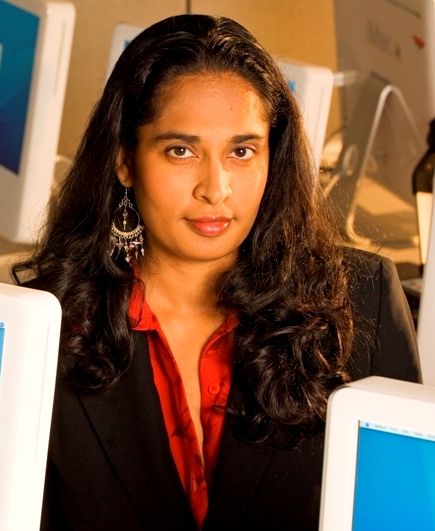 |
Bernardine Dias Associate Research Professor at the Robotics Institute at Carnegie Mellon University M. Bernardine Dias, Ph.D., served as a member of the faculty at the Robotics Institute at Carnegie Mellon University, primarily affiliated with the Field Robotics Center where Dias developed Trader Bots, a robotic task allocation system. Dias is currently founder and CEO of Diyunu Consulting, dedicated to bringing robotics to marginalized populations. |
 |
Sanja Dogramadzi Associate Professor / Reader in Robotics at UWE Bristol Sanja Dogramadzi develops medical and assistive robots at the Bristol Robotics Laboratory. Her research focuses on the multidisciplinary use of robotics technologies in healthcare settings. Dogramadzi has been awarded funding in the range of £2.4M since 2009, currently supervising/managing a team of 15 post-doctoral and doctoral researchers and junior lecturers. Her team won the Best Medical Robotics Paper Award at ICRA 2016. |
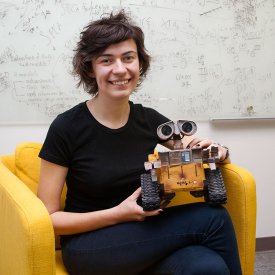 |
Anca Dragan Assistant Professor at UC Berkeley Anca Dragan runs the InterACT Lab at Berkeley, which focusses on algorithms for human-robot interaction. The lab works across different applications, from assistive robots, to manufacturing, to autonomous cars, and draws from optimal control, planning, estimation, learning, and cognitive science. Dragan also helped fund and servee on the steering committee for the Berkeley AI Research (BAIR) Lab, and is a co-PI of the Center for Human-Compatible AI. |
 |
Kimberley Hambuchen Human Robotic Systems Deputy Project Manager at NASA Johnson Space Center Kimberly Hambuchen is an expert in developing novel methods for remote supervision of space robots over intermediate time delays. She has proven the validity of these methods through multiple NASA analog field tests with robots, including the JSC Space Exploration Vehicles, Centaur platforms and Robonaut 2, the ATHLETE rovers from the Jet Propulsion Laboratory, and the Ames Research Center K-10s. She was the User Interface Lead for JSC’s entry into the DARPA Robotics Challenge, using her expertise in remote supervision of robots to guide operator interface development for the DRC robot, Valkyrie. She currently oversees NASA JSC’s participation in the collaboration of the Robot Operations Portal (ROP), which seeks to provide non-expert, web-based interfaces for operating remote robots unavailable to the greater public. |
 |
Kaijen Hsiao CTO at Mayfield Robotics Kaijen Hsiao has been leading innovations in robotics, artificial intelligence, and hardware/software design and development for over 15 years. Hsiao has a history of working on robotics projects that turn into well-funded startup enterprises in the US & Europe. Some of her credits include designing components for agricultural robots, home security and companion robots, service robots, and assistive robots for people with disabilities. Kaijen has worked on high-profile projects at Willow Garage, MIT (CSAIL and Media Lab), Bosch, iRobot, and now Mayfield Robotics. |
 |
M.Ani Hsieh Associate Professor at Drexel University Ani Hsieh focuses on bridging the gap between geophysical fluid dynamics, nonlinear dynamics and control, and distributed multi-agent robotic systems. Hsieh currently works in the Scalable Autonomous System Laboratory at Drexel University. She is a 2011 ONR Summer Faculty Fellow, the recipient of a 2012 Office of Naval Research (ONR) Young Investigator Award, and the recipient of of 2013 National Science Foundation (NSF) CAREER Award. |
 |
Wendy Ju Executive Director and Associate Professor of Interaction Design at Center for Design Research at Stanford University and California College of the Arts Wendy Ju works in the areas of human-robot interaction and automated vehicle interfaces, highlighting the ways that interactive devices can communicate and engage people without interrupting or intruding. Ju has innovated numerous methods for early-stage prototyping of automated systems to understand how people will respond to systems before the systems are built. Her monograph on The Design of Implicit Interactions was published in 2015. |
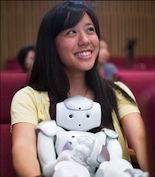 |
Angelica Lim Making Pepper Sociable / Software Engineering Manager at SoftBank Robotics Angelica Lim builds artificial intelligence for robots to interact with humans in a smart, fun, way by combining neuroscience, machine learning, and developmental psychology to model emotion. She currently works as a Software Engineering Manager at SoftBank Robotics in Paris, France. Her previous creations include robots that play music in a human ensemble, speak and gesture with expression, and recognize emotion in movement. |
 |
Gudrun Litzenberger General Secretary and Director of Statistics at International Federation of Robotics Gudrun Litzenberger is on the Executive Board of the International Federation of Robotics, the global not-for-profit industry association for robotics formed in 1987. The purpose of IFR is to promote and strengthen the robotics industry worldwide, to protect its business interests, to cause public awareness about robotics technologies and to deal with other matters of relevance to its members. Litzenberger also oversees the collection and interpretation of market relevant data for world-wide surveys, studies, statistics and other data on the world-wide use of robotics. |
 |
Rosanna Myers Cofounder of Carbon Robotics Rosanna Myers is cofounder of Carbon Robotics, building Katia – a Kick-Ass Trainable Intelligent Arm. Myers is a self-taught software developer with a background in building innovative high tech startups. Carbon Robotics was recently named as one of the Top 50 “most influential public & private companies in the global robotics industry” by the Robotics Business Review. |
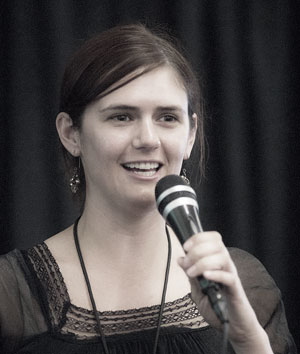 |
Erin Rapacki Business Development at Pneubotics Erin Rapacki is a product storyteller with robotics experience across academia and industry, in both the Boston and Silicon Valley hotspots, with projects ranging from flexible logistics, supply chain, FDA approval, consumer products, military casualty extraction, assistive devices, robotic tele-presence, and warehousing. Rapacki finds ways to catalyze the robotics market by identifying unique value propositions for new robotic products, and by creating community and cooperation between companies and thought leaders. |
 |
Carol Reiley Co-founder / President at drive.ai Carol Reiley is the cofounder and President of drive.ai, an artificial intelligence self-driving car startup. Reiley is also a Computer Science Ph.D. candidate at Johns Hopkins University in robotics and computer vision, and an NSF Graduate Research Fellow researching strategies for improving human and robotic interaction. Her previous works include underwater and industrial robotics at Santa Clara University, space satellites at Lockheed Martin, people detection at GE Research, and clinical development engineering as a consultant at Intuitive Surgical. |
 |
Simone Schürle Research Fellow at Koch Institute of Integrative Cancer Research, MIT Simone Schürle studies Micro- and Nanosystems Technologies with a focus on cancer research. In 2005 she completed a research stay at the University of Canterbury, New Zealand, in the field of Bio Mechanical Engineering. She gained further practical experience during internships in R&D and marketing in Nano Imprint Lithography at SUSS MicroTec in Munich, Germany. Schürle was awarded the ETH Zurich Medal for distinguished doctoral thesis in 2014 for her PhD work on the magnetic control of microrobots. She was then awared a fellowship to go to MIT working at the interface between robotics and nanomedicine. Schürle was recently awarded a Branco Weiss Fellowship to work on merging wireless control of magnetic nanosystems with the engineering potential of synthetic biology. She is also co-founder of the microrobotics company MagnebotiX. |
 |
Katia Sycara Research Professor, Director of Advanced Agent-Robotics Technology Lab at Carnegie Mellon University / University of Aberdeen Katia Sycara is a Research Professor in the School of Computer Science at Carnegie Mellon University and holds the Sixth Century Chair (part time) in Computing Science at the University of Aberdeen in the U.K. She is also the Director of the Laboratory for Agents Technology and Semantic Web Technologies at CMU, researching multi-agent systems. Prof. Sycara is a Fellow of the Institute of Electrical and Electronic Engineers (IEEE), Fellow of the American Association for Artificial Intelligence (AAAI) and the recipient of the 2002 ACM/SIGART Agents Research Award. She is also the recipient of the Outstanding Alumnus Award from the University of Wisconsin in 2005. She is a member of the Scientific Advisory Board of France Telecom, and a member of the Scientific Advisory Board of the Greek National Center of Scientific Research “Demokritos” Information Technology Division. |
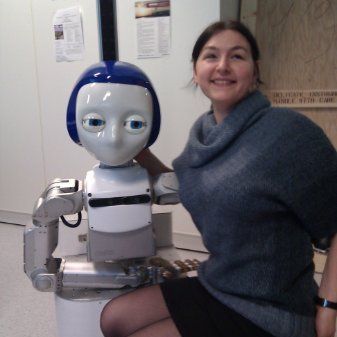 |
Adriana Tapus Vice Provost / Professor at INTERFACES Graduate School, UPSay / ENSTA-ParisTech Adriana Tapus researches the personalization of assistive robots, with a focus on life-long learning and adaptive robot behaviors. Tapus develops different models of personalized interaction applied to health-related applications, cooperation and driving tasks. Tapus currently has a HEROES grant for “Haptic Emotional Robot Experiments with Sensitive Body” as well as a DGA Fellowship, and is active as an academic journal editor, conference program chair and general chair. |
 |
Stefanie Tellex Assistant Professor at Brown University Stefanie Tellex works on constructing robots that seamlessly use natural language to communicate with humans, by applying probabilistic methods, corpus-based training, and decision theory to develop interactive robotic systems that can understand and generate natural language. Tellex has published at SIGIR, HRI, RSS, AAAI, IROS, and ICMI, winning Best Student Paper at SIGIR and ICMI and was named one of IEEE Spectrum’s AI’s 10 to Watch. Stefanie won the Richard B. Salomon Faculty Research Award at Brown University and recently won a NASA Early Career Faculty Award for Human-Robot Collaboration on Complex tasks. |
 |
Patricia Vargas Associate Professor / Founding Director of the Robotics Laboratory at Heriot-Watt University, UK Patricia Vargas is the Founding Director of the Robotics Laboratory and Associate Professor/Reader in Computer Science and Robotics at the School of Mathematical and Computer Science (MACS) at the Heriot-Watt University, in Edinburgh, Scotland. She is particularly interested in: Human-Robot Interaction, Evolutionary Robotics, Swarm Robotics, Computational Neuroscience and Memory Modelling, Biologically-inspired algorithms in general, such as Artificial Neural Networks, Artificial Endocrine Systems, Artificial Immune Systems, and Learning Classifier Systems, and Data Mining and Machine Learning. |
 |
Hanna Wallach Senior Researcher / Assistant Professor / Cofounder at Microsoft Research / UMass Amherst / Women in Machine Learning Hanna Wallach develops machine learning methods for analyzing the structure, content, and dynamics of social processes. Her work is inherently interdisciplinary: she collaborates with political scientists, sociologists, and journalists to understand how organizations work by analyzing publicly available interaction data, such as email networks, document collections, press releases, meeting transcripts, and news articles. She also studies issues of fairness, accountability, and transparency as they relate to machine learning. Wallach’s research has had broad impact in machine learning, natural language processing, and computational social science. In 2014, she was named one of Glamour magazine’s “35 Women Under 35 Who Are Changing the Tech Industry”; in 2015, she was elected to the International Machine Learning Society’s Board of Trustees; and in 2016, she was named co-winner of the 2016 Borg Early Career Award. Hanna is committed to increasing diversity and has worked for over a decade to address the underrepresentation of women in computing. She co-founded the annual Women in Machine Learning Workshop, which is now in its eleventh year. |
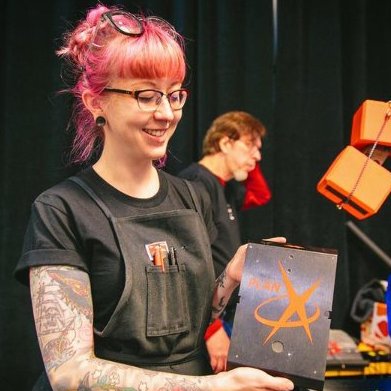 |
Lisa Winter Product Design Engineer at Mattel, Inc. A roboticist since childhood, Lisa Winter has 20 years experience designing and building robots. She was crowned the Robot Wars Middleweight World Champion and has been in many publications, including MAKE magazine. In 2012, Winter cofounded smart toy company Robot 11, building smart wearables and Bluetooth connected toys. She has been inventing and rapid prototyping connected devices since the beginning of the IoT movement. Winter is currently the Product Design Engineer at Mattel, developing a smart wearable baby monitor. At night she builds combat robots for ABC’s BattleBots, and dreams of ways to help animals and the environment. |
 |
Rosalie Wang Assistant Professor at Intelligent and Assistive Technology and Systems Lab, University of Toronto / Toronto Rehabilitative Institute Rosalie Wang’s focus is on developing and clinically evaluating intelligent systems for rehabilitation, and as clinical Occupational Therapist, she brings a unique approach to evaluating user-centered and context-relevant design for robotic assistive technologies. |
Do you have a story to tell about how visibility helped your robotics career? Would you like to nominate someone for next year’s list? Do you want to help organize Women in Robotics events or join the Women in Robotics network? We’d love to hear from you. You can ask for an invitation to the Women in Robotics network here. Know of any great women in robotics who should be on this list next year? Check the lists from our previous years (2013, 2014, and 2015), and feel free to leave your nominations in the comments section below, or email us at info [at] robohub.org.
If you liked this article, you may also be interested in:
- 25 women in robotics you need to know about (2013)
- 25 women in robotics you need to know about (2014)
- 25 women in robotics you need to know about (2015)
- Five women robotics experts from Silicon Valley share their stories
- Steffi Paepcke on Robots, women and design: Opportunities abound
See all the latest robotics news on Robohub, or sign up for our weekly newsletter.
tags: c-Politics-Law-Society, robohub focus on diversity, women in robotics, women in robotics list











